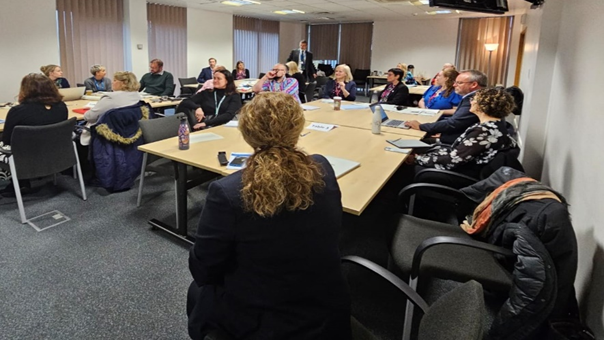Committing to Enhancing Staff Engagement and Employee Experience at all Leadership Levels – Manchester University NHS Foundation Trust

Manchester University NHS Foundation Trust (MFT), one of the largest and most complex NHS trusts in the UK. It operates multiple hospitals and provides a broad range of medical services to a diverse population. The trust is committed to improving patient care and staff well-being.
The Ambition

The Executive Team wanted to enhance staff engagement and overall employee experience, particularly after the National Staff Survey 2022 revealed that there had been no significant improvement in staff engagement scores over the previous five years. They sought to create a more positive working environment by addressing key issues identified by the staff.
Launching New Initiatives
The senior leadership team introduced a new initiative by launching a series of collaborative workshops. These workshops were commissioned specifically by the Group Executive Director of Workforce and Corporate Business and involved the active participation of Chief Executives and HR Directors across the organisation.
- The workshops aimed to:
- Analyse the staff survey benchmarking data.
- Identify key issues affecting staff experience.
- Develop cross-functional projects to address these issues at a system-wide level.
Six key programmes were identified and developed, focusing on areas that mattered most to staff:

- Flexible Working: Enhancing work-life balance by offering more flexible work options.
- Car Parking & Transport: Improving access and convenience for staff commuting to work.
- Food Provision: Enhancing the quality and availability of food options for staff.
- Management Support: Providing better support and development opportunities for managers.
- Stretch Opportunities: Offering more opportunities for career growth and skill development.
- Colleague Community: Fostering a stronger sense of community and collaboration among staff.
Project teams were formed for each of these areas, and action plans were developed to address the identified issues. The trust also built a dedicated intranet site to keep staff informed and engaged, and regular updates were communicated through various channels.
The Impact of New Initiatives

The initiative resulted in several positive outcomes:
- Improved Staff Engagement: The overall Staff Engagement score increased from 6.5 to 6.8, reflecting improvement in how staff felt about their environment.
- Higher Survey Response Rates: The response rate for the staff survey increased from 30% to 39%, indicating greater staff involvement and willingness to provide feedback.
- Positive Shifts in Key Metrics: There were significant improvements in key survey metrics, such as the percentage of staff who would recommend the organisation as a place to work (up from 49.93% to 57.39%) and the percentage of staff who would be happy with the standard of care provided to their relatives (up from 58.56% to 63.55%).
- Retention and Sickness: The trust saw a consistent improvement in staff retention, with stability index increasing from 86.3% in January 2023 to 88.9%. Sickness absence also declined from 6.9% to 5.9% over the same period, contributing to better staff well-being and reduced costs associated with recruitment and agency support.
- Wider Benefits: The improvements in staff engagement had a positive impact on patient care, with teams that reported higher engagement scores also delivering better patient experiences.
Key Learnings
Senior Leadership Engagement
The active involvement of senior leaders, including Chief Executives and HR Directors, was crucial in driving the initiative forward and ensuring its success.
System-Wide Approach
Addressing staff experience issues required a collaborative, system-wide approach rather than isolated efforts. The workshops provided a platform for cross-functional collaboration and problem-solving.
Data-Driven Decision-Making
Using staff survey data and evidence-based models like Maslow’s Hierarchy of Needs helped to identify and prioritize the issues that mattered most to staff, leading to more targeted and effective interventions.
Clear Governance and Accountability
Establishing strong governance structures, such as the Staff Experience Oversight Board, ensured that there was clear accountability for delivering the projects and that progress was monitored regularly.
Next Steps and Sustainability
The Executive Team have embedded the principles behind the Collaborative workshops into an annual roadmap of engagement activities. This includes:
- Listening Events and Focus Groups: Regular opportunities for staff to provide feedback and share their experiences.
- Cultural Change Agents: Implementation of agents across MFT to support ongoing cultural transformation and positive change.
- Staff Experience Oversight Board: A newly established board to provide governance, focus, and accountability for the ongoing improvement of staff experience. The board will ensure that the initiatives continue to align with strategic objectives and deliver sustained improvements.
- Annual National Staff Survey: The survey data will continue to be used as a key tool for identifying priority areas and driving the agenda for staff experience improvements.
- Executive Support: The commitment of the Group Chief Executive and the executive team remains strong, with staff experience now a key topic of discussion at monthly meetings. Regular communications from the CEO emphasise the importance of hearing and responding to the staff voice.
The leadership approach to staff engagement is now firmly integrated into its broader strategic and operational planning, ensuring that these efforts are sustainable and continue to evolve in response to staff needs.
Contact Information
For more information about this case study contact:
Tracy Milnes
OD Manager
Tracy.Milnes@mft.nhs.uk